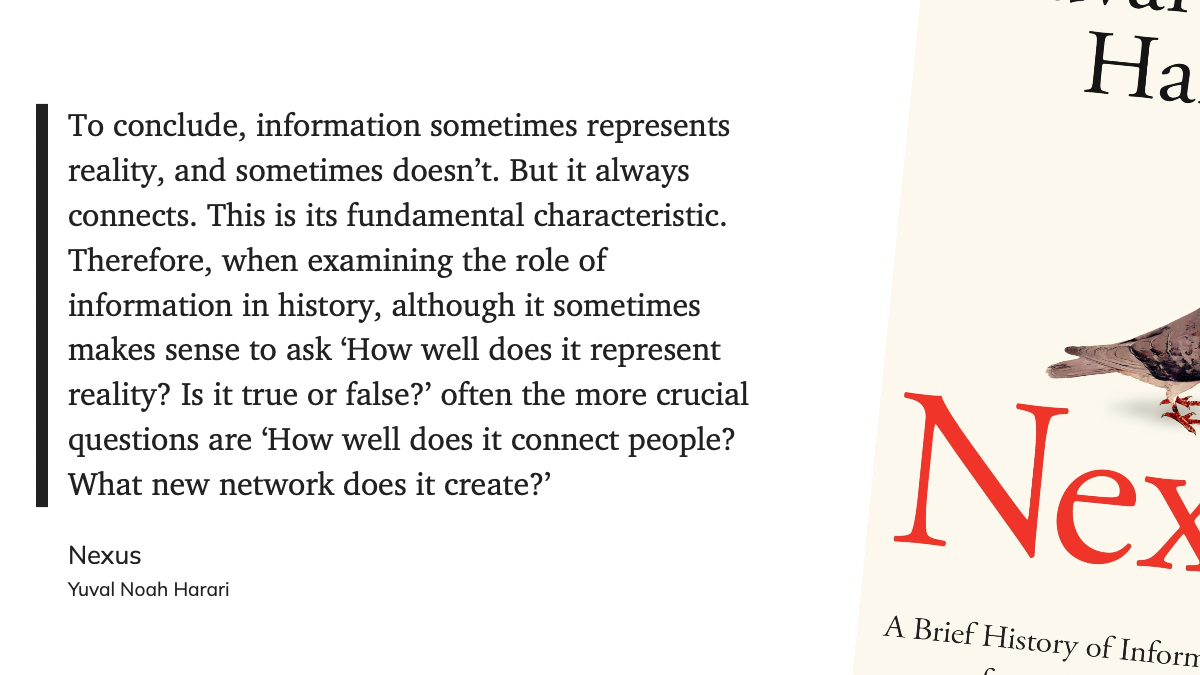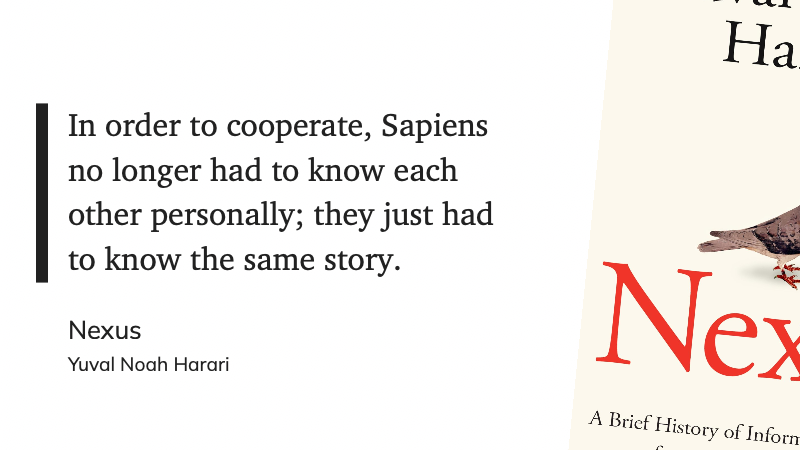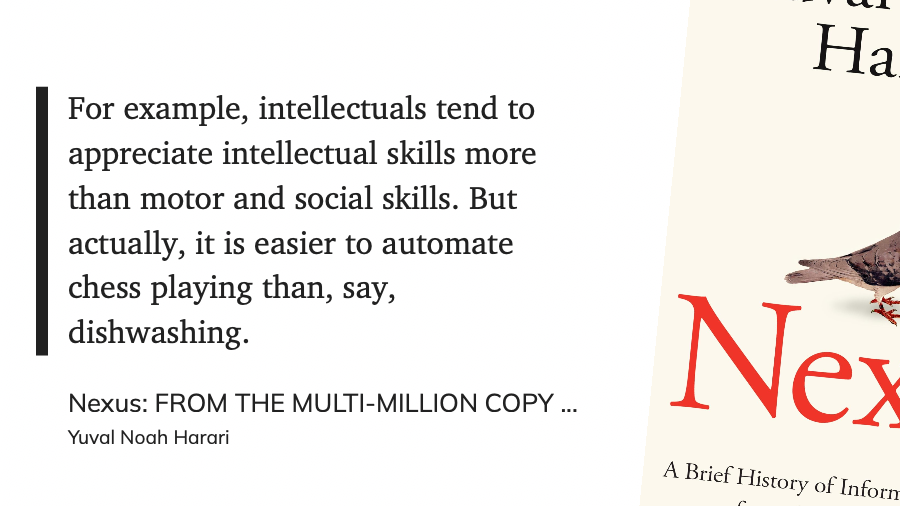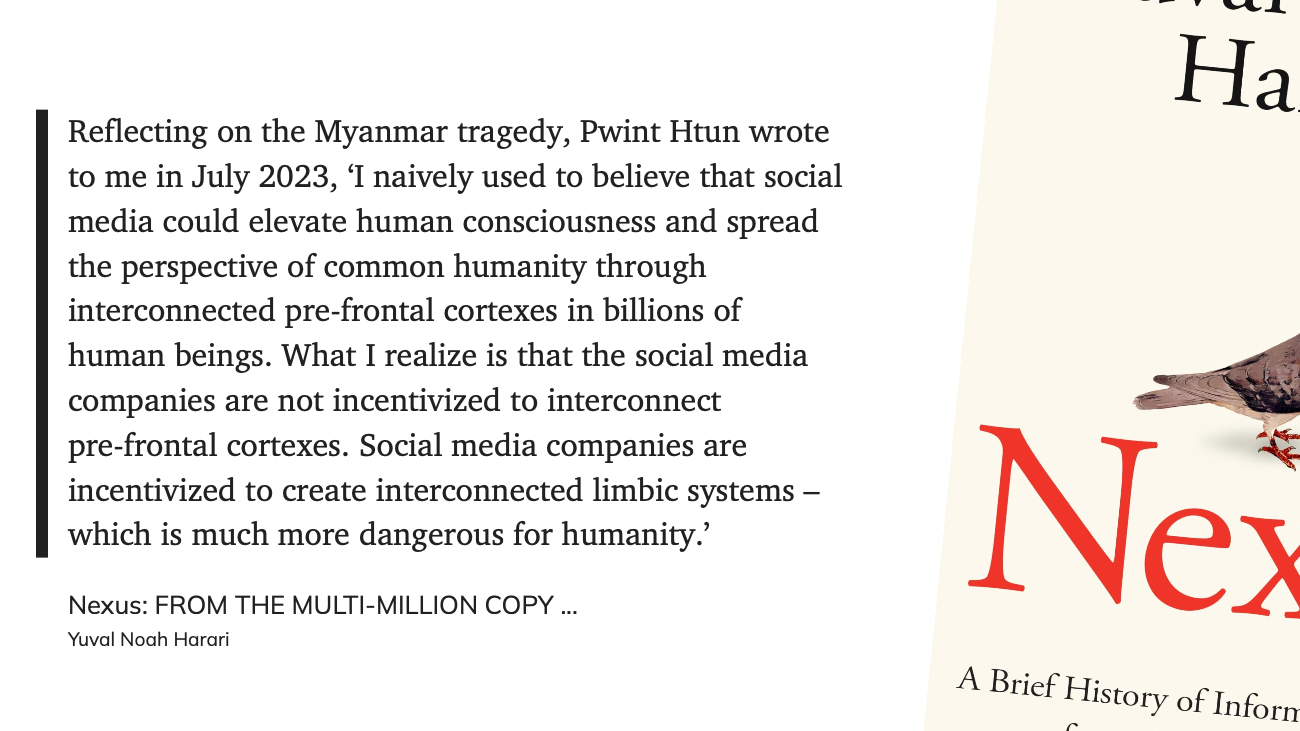
Review of Nexus by Yuval Noah Harari – Best book to understand impact of AI
The age of Artificial Intelligence (AI) is upon us, and here is the review of Yuval Noah Harari’s Nexus which stands out as one of the most comprehensive, insightful, and engaging books on the subject available today. Harari masterfully examines the transformative power of AI and its implications for humanity, making it a must-read for anyone grappling with this new era.
As I read this book, a scene from the 1999 movie Matrix kept playing in my head. If you remember, it’s when Neo first meets Morpheus. Neo has this strange feeling that something’s off about the world around him. He thinks his life is controlled by some outside force, like ‘The Matrix,’ but he can’t quite put his finger on it.
Then Morpheus drops the bombshell. He explains what the Matrix is. He says, ‘The Matrix is everywhere. It’s all around us. Even right now, in this very room, you can see it when you look out the window or turn on your TV. You can feel it when you go to work, church, or pay your taxes. It’s the world that’s been hidden from you to keep you in the dark. The truth is, you’re a slave, just like everyone else. You were born into bondage, born into a prison you can’t smell, taste, or touch. It’s a prison for your mind. And unfortunately, no one can tell you what the Matrix is. You have to see it for yourself.’
The same question kept coming to me, ‘Have our minds become slaves to the technology? Are our lives being controlled by some alien entity called AI?’
A few days ago, I was searching for a kickstand clip for my iPad on Amazon. Despite several attempts, I couldn’t find exactly what I wanted. Instead, Amazon suggested kickstand clips for iPhones—likely because it knew I’d recently purchased an iPhone. The features were appealing, the price was tempting, and before I knew it, I’d bought a product I hadn’t even intended to consider. AI had subtly persuaded me.
Isn’t this happening to all of us? We’re bombarded with targeted advertisements based on our searches, purchases, and even conversations. Often, we’re lured into buying products or services we don’t need—or didn’t even realize we wanted. But it doesn’t stop there. AI is selling us not just goods but also ideas, thoughts, and beliefs, often without us realizing it.
In Nexus, Harari, celebrated for his best-seller Sapiens, delves into the historical evolution of information networks. He recounts humanity’s remarkable ability to cooperate on a large scale—a trait that has propelled our species forward. To foster this cooperation, humans created shared stories, myths, and ideologies, disseminated through ever-evolving communication tools.
From ancient clay tablets to the printing press, telegraph, radio, and television, each innovation reshaped humanity’s trajectory. With each step forward, we gained something new while losing something else. Then came the computer, the Internet, and now AI. Unlike earlier tools, the Internet became ubiquitous, embedding itself so deeply in our lives that we can no longer imagine functioning without it.
Until recently, humans maintained control over these tools. But AI has changed the game. Machines now possess not only intelligence but also the ability to learn and adapt without human intervention. These self-sufficient systems are taking over countless tasks and jobs, reshaping industries and lives.
Though AI is still in its infancy, its impact is already profound. It is altering our politics, culture, habits, relationships, and even our thought processes. Harari uses history as a guide to help us understand how previous information networks shaped humanity, and he applies those lessons to predict AI’s potential to redefine our future—for better or worse.
Nexus is an essential read for anyone who wants to understand the forces shaping our world and prepare for what lies ahead. Harari’s ability to combine historical context with forward-thinking analysis makes the book both enlightening and deeply engaging.
Reading Insights
This book is a fascinating blend of non-fiction and speculative fiction about how AI might shape our future. Harari’s unique writing style, where he introduces complex concepts with intriguing historical examples, makes this an engaging read. It took me about 12 hours to finish it, and the language is straightforward, so you won’t need a dictionary much.
The book explores many imagined possibilities about the future of AI, some of which seem quite outlandish. But that’s the point – we’re entering a new era, and it’s important to imagine and prepare for even the most extreme possibilities.
About the author (From Goodreads)
Professor Yuval Noah Harari is a historian, philosopher, and the bestselling author of Sapiens: A Brief History of Humankind, Homo Deus: A Brief History of Tomorrow, 21 Lessons for the 21st Century, and the series Sapiens: A Graphic History and Unstoppable Us. He is considered one of the world’s most influential public intellectuals working today.
Born in Israel in 1976, Harari received his Ph.D. from the University of Oxford in 2002. He is currently a lecturer at the Department of History at the Hebrew University of Jerusalem, and a Distinguished Research Fellow at the University of Cambridge’s Centre for the Study of Existential Risk. Harari co-founded the social impact company Sapienship, focused on education and storytelling, with his husband, Itzik Yahav.
My Favourite Quotes
Get this book
You can buy here Nexus: A Brief History of Information Networks from the Stone Age to AI
















👍👍👌👌
Thanks
I literally got transported into an intriguing world of thoughts and imagination and forgot that it’s bed time and there’s a set schedule of tasks lying ahead in the morning which would once again make me such a machine man ( closer to AI driven ). Thanks for sharing and it’s such a success if I call it an attempt to keep world of words alive for rest of us too !👏🏻👏🏻 AI certainly has a huge impact to make in near future and seems like we need to be motivated to put it into some
good use .
Thanks for your comment. We have to understand the implications of AI in depth to make it work for the betterment of humanity.
Very good selection of the book & thank you for this interesting summary of the book; liked it.👍
In today’s digital world, there are very few persons like Harare, who talk very clearly about the dire consequences of over dependence on technology. He also highlights the role of morality & ethics which I appreciate the most 🙂
Glad that you liked the summary. I am sure you will love the book. Harari is a genius.